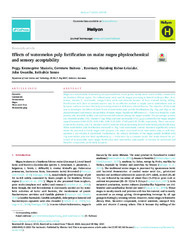Effects of watermelon pulp fortification on maize mageu physicochemical and sensory acceptability.
Date
2021-05-25Author
Maakelo, Peggy Keamogetse
Bultosa, Geremew
Kobue-Lekalake, Rosemary Ikalafeng
Gwamba, John
Sonno, Kethabile
Metadata
Show full item recordAbstract
Mageu is a non-alcoholic fermented gruel processed from cereal grains, mostly maize and is widely consumed in the Southern African region. The refined maize meal used for mageu processing is limited in dietary fiber, B-vitamins, vitamin C, carotenoids, omega-3 fatty acids and minerals because of bran removal during milling. Fortification with plant carotenoid sources may be an effective method to supply potent antioxidants such as lycopene and beta-carotene that help preventing vitamin A deficiency related diseases. The objective of this study was to investigate the effects of three levels of watermelon pulp powder fortifications (5g, 10g, and 15g) on the physicochemical and sensory acceptability of maize mageu. Significant difference (p < 0.05) was found for crude protein, ash, titratable acidity, and total carotenoid contents among the mageu samples. The percentage protein, ash, titratable acidity (TA), vitamin C (mg/100g) and total carotenoids (TC) (μg/g) contents for the mageu samples ranged between 10.60-13.70, 0.53–0.86, 0.08–0.15, 8.81–17.60 and 0.00–51.60, respectively. There was an increase in the protein, ash, TA, vitamin C and TC contents with an increasing level of watermelon pulp fortification. When watermelon pulp fortification increased to 15g, total carotenoids content increased significantly which shows the potential to fortify mageu with lycopene, the major carotenoid in the watermelon pulp, as well beta-carotene a pro-vitamin A carotenoid. Furthermore, the sensory attributes of the mageu sample fortified with 15g watermelon pulp was liked significantly (p < 0.05) more by a consumer panel. The study showed the potential of an acceptable maize mageu fortification with watermelon pulp powder to increase its nutritional and bioactive compounds, particularly lycopene.
URI
http://www.heliyon.com/https://doi.org/10.1016/j.heliyon.2021.e07128
https://hdl.handle.net/13049/468
Collections
- Reseach articles [146]

